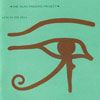THE ALAN PARSONS PROJECT : EYE IN THE SKY
- Sirius
- Eye in the Sky
- Children of the Moon
- Gemini
- Silence and I
- You're Gonna Get Your Fingers Burned
- Psychobabble
- Mammagamma
- Step by Step
- Old and Wise
Label : Arista
Release Year : 1982
Length : 42:28
Review (AllMusic) : Eye in the Sky provided the Alan Parsons Project with their first Top Ten hit since 1977's I Robot, and it's hard not to feel that crossover success was one of the driving forces behind this album. The Project never shied away from hooks, whether it was on the tense white funk of "I Wouldn't Want to Be Like You" or the gleaming pop hooks of "Games People Play," but Eye in the Sky was soft and smooth, so smooth that it was easy to ignore that the narrator of the title track was an ominous omniscient who spied either on his lover or his populace, depending on how deeply you wanted to delve into the concepts of this album. And, unlike I Robot or The Turn of a Friendly Card, it is possible to listen to Eye in the Sky and not dwell on the larger themes, since they're used as a foundation, not pushed to center stage. What does dominate is the lushness of sound, the sweetness of melody: this is a soft rock album through and through, one that's about melodic hooks and texture. In the case of the spacy opening salvo "Sirius," later heard on sports talk shows across America, or "Mammagamma," it was all texture, as these instrumentals set the trippy yet warm mood that the pop songs sustained. And the real difference with Eye in the Sky is that, with the exception of those instrumentals and the galloping suite "Silence and I," all the artiness was part of the idea of this album was pushed into the lyrics, so the album plays as soft pop album - and a very, very good one at that. Perhaps nothing is quite as exquisite as the title song, yet "Children of the Moon" has a sprightly gait (not all that dissimilar from Kenny Loggins' "Heart to Heart"), "Psychobabble" has a bright propulsive edge (not all that dissimilar from 10cc), and "Gemini" is the project at its dreamiest. It all adds up to arguably the most consistent Alan Parsons Project album - perhaps not in terms of concept, but in terms of music they never were as satisfying as they were here.
